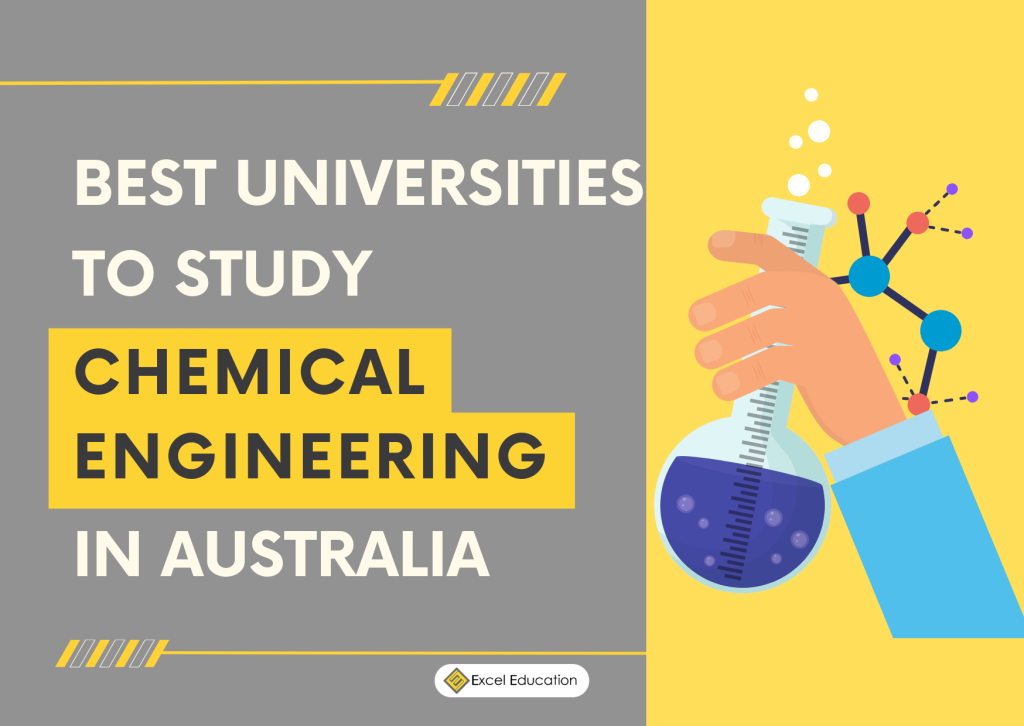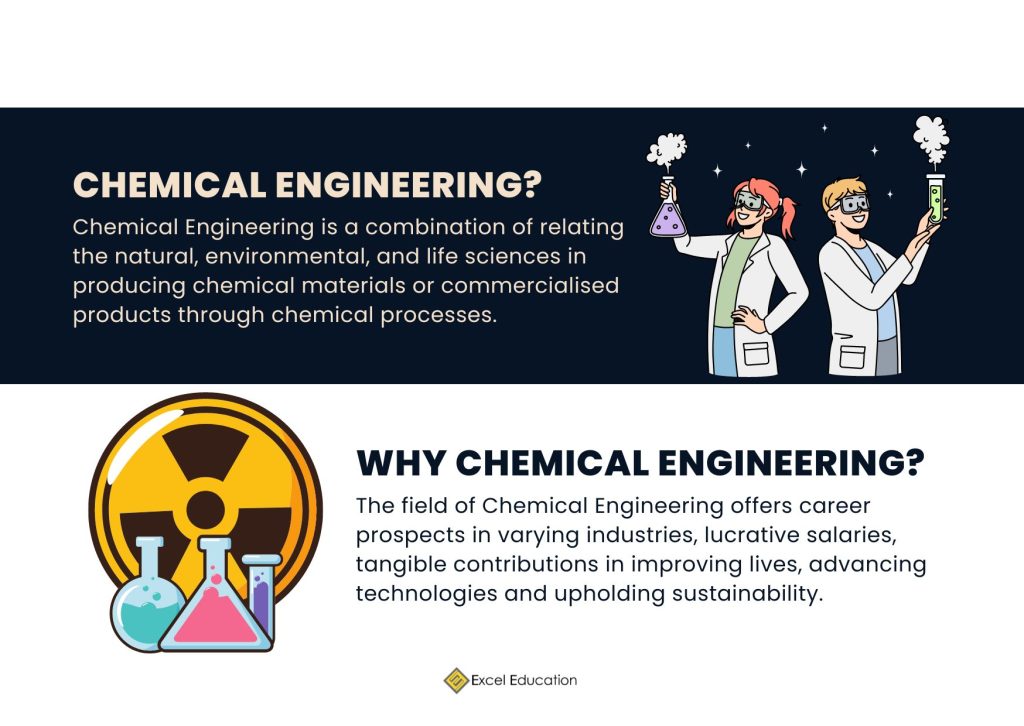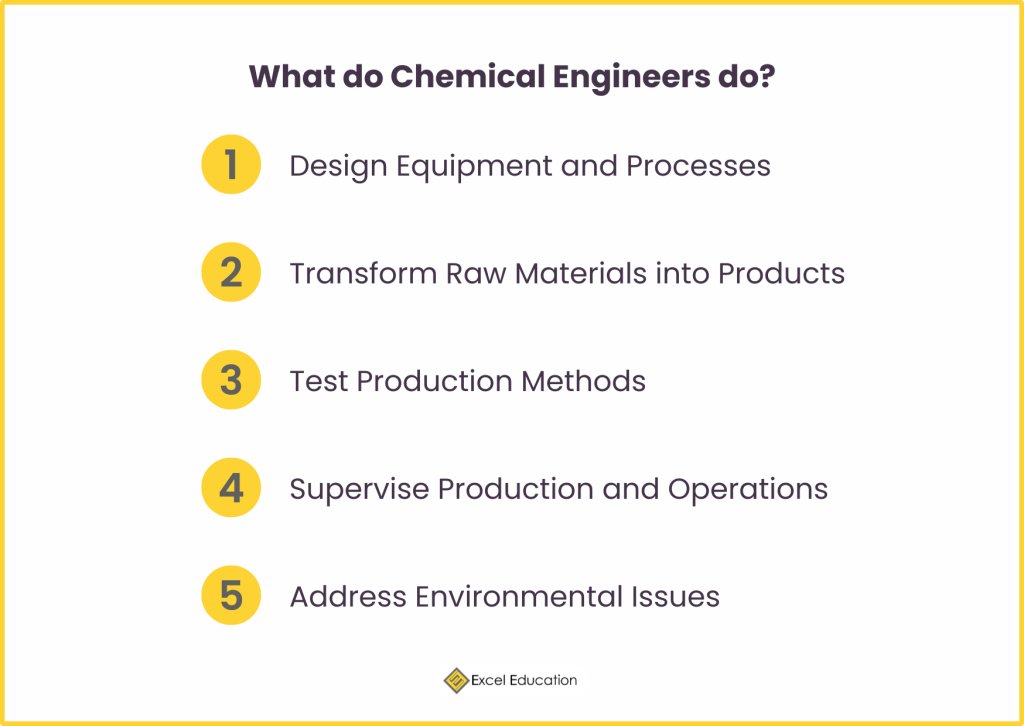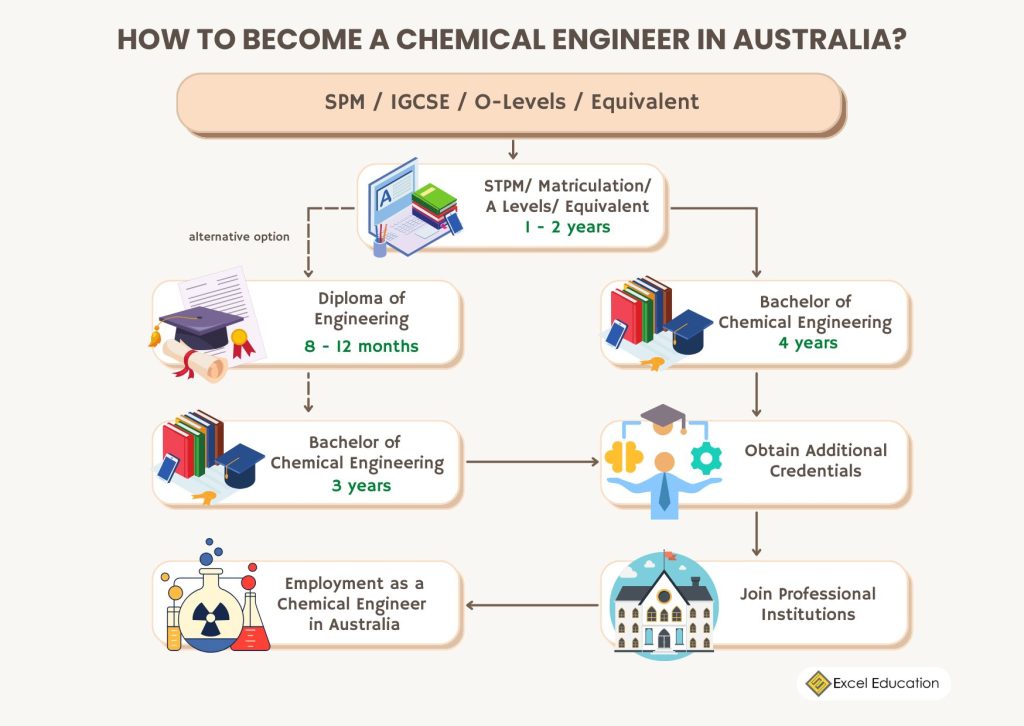
The secret for the fizz in sodas ranging all the way to renewable or solar energy is *drumroll* Chemical Engineering. If you want to do something which involves problem solving and Chemistry, Chemical Engineering is the way to go. Keep reading to find out some of the best universities to study Chemical Engineering in Australia.
What is Chemical Engineering?

Chemical Engineering is a combination of natural, environmental, and life sciences in producing chemical materials or commercialised products through chemical processes.
Chemical Engineering extends to the design of chemical equipment, chemical systems, and chemical processes centering on the conversion of raw materials into usable products including, medicine, paper, food and beverages, and fuels. In another way, Chemical Engineering involves the study and application of chemicals.
Wait, if so, then, how does Chemical Engineering differ from Chemistry?
In terms of study, Chemistry involves learning way more Chemistry principles than Chemical Engineering. On the other hand, Chemical Engineering is the combination of Chemistry, Physics, Mathematics and Engineering principles. An apparent difference would be that Chemistry focuses on science while Chemical Engineering centres on manufacturing with sprinkles of science.
The field of Chemical Engineering offers career prospects in varying industries and lucrative salaries. Not only that, the field allows for tangible contributions in improving lives by finding innovative solutions to challenges in advancing technologies and upholding sustainability.
What do Chemical Engineers do?

Duties of a Chemical Engineer may vary depending on their role or the industry they are in, but generally, a Chemical Engineer might carry out these duties:
1. Design Equipment and Processes
Chemical Engineers design equipment and processes to develop optimum methods in manufacturing a product. This is where their Chemistry Engineering knowledge comes into play as they would know what materials or equipment parameters are most suitable for specific processes.
2. Transform Raw Materials into Products
Chemical Engineers transform raw materials into products which are commercialised for the use of consumers, or the general public. For instance, Chemical Engineers are responsible for the existence of diesel, fuel oil, and asphalt, derived from crude oil.
3. Test Production Methods
In order to design manufacturing processes which are efficient and optimal, testing in production methods are necessary. Thus, testing production methods can be a big part of a Chemical Engineer’s work day.
4. Supervise Production and Operations
Chemical Engineers are responsible for supervising production and operations of any industrial manufacturing. As such, they are liable in the safety adherence of a laboratory or a power plant ensuring hazards are taken note of.
5. Address Environmental Issues
In some circumstances, Chemical Engineers address environmental issues by ensuring their manufacturing processes have minimal environmental effects. Chemical Engineers would have to consider any chemical emissions, chemical waste, and all consumptions involved in their processes.
Skills Required to Study Chemical Engineering

- Engineering Thermodynamics
Thermodynamics is a concept highly integral in Chemical Engineering. Engineering thermodynamics ensures proficiency in understanding chemical kinetics, reaction rates and mechanisms, which are important components in designing efficient chemical processes and making educated guesses for chemical parameters.
- Reaction Engineering
Competency in reaction Engineering warrants optimal and efficient chemical conversions to produce desired products. In addition, competency in reaction Engineering guides in factoring elements such as reaction rates, reactor design, and chemical catalysts.
- Operations Analysis
Operation analysis is a critical aspect in Chemical Engineering to guarantee chemical processes run efficiently. Operation analysis can be done by monitoring data and statistics in experimental results alongside factoring in materials science components.
- Mathematical Aptitude
Mathematical aptitude is beneficial in problem solving using mathematical formulas and methods, which is prevalent in Chemical Engineering. Chemical Engineers are expected to be able to do quick and accurate mathematical calculations.
- Safety Compliance
Safety compliance, alongside ethics and legalities, are imperative elements in Chemical Engineering. These elements aid in avoiding potential risks or hazards in chemical processes, making it important for Chemical Engineers to comply with safety and ethical regulations.
Career Options for Chemical Engineer Graduates
Depending on interests and passions, there are various career options for Chemical Engineering graduates:
- Chemical Engineer
- Petroleum Engineer
- Production Engineer
- Environmental Engineer
- Service Engineer
- Food Process Engineer
- Materials Engineer
- Biopharmaceutical Engineer
- Technical Manager
- Water Treatment Engineer
The reported average annual salary for a Chemical Engineer in Australia ranges from £85,000 to £105,000.
How to become a Chemical Engineer in Australia?

First, complete SPM or equivalent examinations.
The initial step for your journey into becoming a Chemical Engineer is to complete high school qualifications through SPM or any equivalent examination. It could greatly benefit future applications if you have taken Additional Mathematics and Chemistry subjects.
Second, complete relevant pre-university qualifications.
Enrol and complete relevant pre-university study programmes which will qualify you into a Bachelor of Chemical Engineering programme in Australia.
You also have the option of enrolling in a Diploma of Engineering in Australia, taking up 8-12 months. This alternative route would enable you to gain entry to the second year of a Bachelor of Chemical Engineering programme in Australia. However, this is highly dependent on your scores and the institution you are enrolled in.
Third, enrol in an accredited Bachelor of Chemical Engineering programme.
Then, enrol in an accredited Bachelor of Chemical Engineering programme. This step could take up to 4 years. Though, with a Diploma of Engineering, this step would take up 3 years. Accreditations for the Bachelor of Chemical Engineering programmes in Australia are typically granted by Engineers Australia (EA) or the Institution of Chemical Engineers (IChemE).
Additionally, in this stage, you should build your portfolio and boost professional developments by participating in internships as it would benefit when applying for full-time careers upon graduation.
Next, obtain additional qualifications.
Completion of your Bachelors would allow for employment, but, it is advisable to consider a master’s degree in Chemical Engineering or related specialisations. A master’s degree often takes around 2-3 years to complete.
Afterwards, join professional institutions.
Upon completing your degrees, you can join professional institutions such as Engineers Australia (EA) or the Institution of Chemical Engineers (IChemE). These institutions benefit in finding employment and establishing professional connections. Also, you can also obtain the National Engineering Registration (NER) credential.
Finally, join employment as a professionally registered Chemical Engineer with appropriate titles.
One road to Permanent Residency (PR) in Australia is through occupation as a Chemical Engineer. Chemical Engineers are under the Medium and Long-term Strategic Skills List (MLTSSL) where an occupation is projected to be in demand for medium to long term duration. Chemical Engineers under MLTSSL have the opportunity for migration to Australia such as via the subclass 494 (Skilled Employer Sponsored Regional (Provisional) visa. Keep in mind there are other visa subclasses that you may apply for.
When you are eligible to apply for permanent residency, you can apply for permanent resident visa such as subclass 189 (Skilled Independent) or subclass 190 (Skilled Nominated). The choice of visa may vary from occupation, eligibility, regional preference and wish to acquire permanent residence.
General Entry Requirements to Study Chemical Engineering
Academic Entry
Do take note that most Chemical Engineering programmes have Chemistry and a Mathematics subject as prerequisites into the programmes.
Academic Entry | Minimum Score |
STPM | GPA 2.33 |
Matriculation | Overall GPA 2.75 |
A-Levels | 7 Points for 3 A Level Subjects (i.e. CDD) |
UEC | GPA 2.20 |
IB Diploma | 28 |
Australian Matriculation (ATAR) | 80 |
Canadian Pre-University (CPU) | 60 |
Note: Universities may have different requirements. To learn more, get in touch with us!
English Language Entry Requirements
Entry Level | Minimum Score |
IELTS | 6.5 |
TOEFL | 79 |
Pearson Test of English (PTE) | 58 |
Note: Universities may have different requirements. To learn more, get in touch with us!
Top Universities to Study Chemical Engineering in Australia
1. University of Sydney (USYD)

The University of Sydney, additionally referred to as USYD, was founded in 1850. USYD is Australia’s oldest university, as reflected by its sandstone exterior design. The University of Sydney was ranked 19th among universities worldwide in 2024 and is a member of the Group of Eight (Go8) network, marking it as an ideal study destination option.
The University of Sydney offers an accredited Bachelor of Engineering Honours (Chemical and Biomolecular Engineering) programme for those interested in studying Chemical Engineering in Australia. The programme aims to equip students with specialised technical knowledge in Chemical and Biomolecular Engineering through comprehensive Chemical Engineering curriculum, professional engagement activities, and Engineering work experiences.
Programme Offered | Bachelor of Engineering Honours (Chemical and Biomolecular Engineering) |
Duration | 4 Years |
Intake | February, July |
Indicative Fees (2024) | International Students: AU$224,000 |
Contact us right now for a free consultation if you’d like more details about the costs, the format of the programme, and the entry requirements!
2. Monash University

Monash University is Australia’s largest public higher education learning institution with campuses in Malaysia, Italy, India, and China. Monash, established in 1958, has been placed in the top 100 over different ranking platforms proving their dedication to quality education and renowned research.
In 2024, Monash was placed second among universities in Australia and in the top 50 for universities globally for the Chemical Engineering subject. Monash offers an accredited Chemical Engineering degree through their Bachelor of Engineering programme, where prospective students will experience industry-based learning with embedded internships to increase their career prospects.
Programme Offered | Bachelor of Engineering Specialisation In:
|
Duration | 4 Years |
Intake | February, July |
Indicative Fees (2024) | International Students: AU$212,800 |
Contact us right now for a free consultation if you’d like more details about the costs, the format of the programme, and the entry requirements!
3. University of Queensland (UQ)

The University of Queensland, commonly referred to as UQ, is a prominent public research university with its main counterpart in Brisbane. The University of Queensland was established in 1909 with unwavering academic dedication awarding the university in the top 50 among universities worldwide for the year of 2024.
Plus, the University of Queensland comes in first among Australian universities and in the top 50 among universities worldwide for the Chemical Engineering subject in 2024. Students can specialise in Chemical Engineering through UQ’s Bachelor of Engineering (Honours) programme where learning can be done fieldwork, workshops, laboratory work, overseas study, as well as work placements.
Programme Offered | Bachelor of Engineering (Honours) Specialisation In:
|
Duration | 4 Years |
Intake | February, July |
Indicative Fees (2024) | International Students: AU$204,800 |
Contact us right now for a free consultation if you’d like more details about the costs, the format of the programme, and the entry requirements!
4. Queensland University of Technology

Queensland University of Technology, rather QUT, is a notable public tertiary learning institution with history dating back to 1849. Queensland University of Technology has made its mark in academia, proven through its rank in the top 15 among universities in Australia for the year of 2024.
The Bachelor of Engineering (Honours) (Chemical and Sustainable Process) programme offered at Queensland University of Technology has professional accreditations where students have access to opportunities for site visits, work integrated learning, and research projects. The programme aims to nurture graduates with proper knowledge, technical skills, strong project management and leadership skills, ready to approach multidisciplinary challenges in the professional field of Chemical Engineering.
Programme Offered | Bachelor of Engineering (Honours) (Chemical and Sustainable Process) |
Duration | 4 Years |
Intake | February, July |
Indicative Fees (2024) | International Students: AU$169,600 |
Contact us right now for a free consultation if you’d like more details about the costs, the format of the programme, and the entry requirements!
5. Curtin University

Curtin University is a distinguished public research university which was inaugurated in 1966. Curtin University is a reputable study destination, noting their ranks in the top 15 among universities in Australia for the year 2024 as well as their globally recognised innovative courses and programmes.
For the Engineering and Technology subject in 2024, Curtin University is ranked in the sixth spot amongst Australian Universities. Prospective students benefit from accredited Chemical Engineering syllabuses, enviable suite of facilities, industry opportunities, and a comparatively affordable fee for quality education.
Programme Offered | Bachelor of Engineering (Honours) Major In:
|
Duration | 4 Years |
Intake | February, July |
Indicative Fees (2024) | International Students: AU$150,029 |
Contact us right now for a free consultation if you’d like more details about the costs, the format of the programme, and the entry requirements!
For more information regarding the university, programme offered, entry requirements and fees, contact Excel Education.
About The Author

Hannah Hir
Hannah appreciates various art forms, especially Asian literature, film and music. Most of her favorite Malaysian kuihs are green-coloured.

